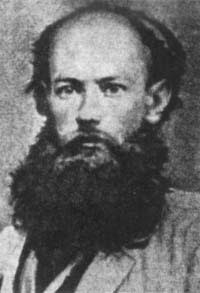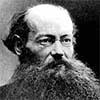Pyotr Kropotkin (9 Dec 1842 – 8 Feb1921) Sociability as a Law of Nature
BIOGRAPHIES, 14 Dec 2015
Rene Wadlow – TRANSCEND Media Service
The history of human thought recalls the swinging of a pendulum which takes centuries to swing. After a long period of slumber comes a moment of awakening. Then thought frees herself from the chains with which those interested − rulers, lawyers, clerics − have enwound her.
9 December is the birth anniversary of Prince Pyotr Kropotkin who dropped the aristocratic title of Prince when he was 12, and having lived much of his adult life in Switzerland and England is often called Peter. Although from an early age he was against hierarchies and bureaucratic control of society, he first followed in the footsteps of his father and became a military officer. But his real love was geography and exploration, and he used his military position to explore Siberia and Manchuria. He was particularly interested in observing wild life − animals and birds and their interaction with their setting − an ecologist before his time.
After his explorations for the military, he gave up his military office in 1867 to work full time as a geographer. His father, angered by his decision, disinherited him and cut off any financing. Pyotr had already been interested in and sympathetic to the peasantry he had met. He was increasingly drawn to ideas of a cooperative society based on self-sufficiency and solidarity. As many Russians of his class and time, he wanted to see what was being done in Western Europe. Thus in 1872, he went to Switzerland, and there met leaders of the Jura Federation − mostly watchmakers who had organized themselves into a sort of trade union. However, they called themselves anarchists, a title that Kropotkin welcomed.
On his return to Russia, he tried to organize anarchist groups, working for the creation of cooperatives and forms of mutual aid. However, for the Tsarist police, anarchists were bomb-throwers, and he was arrested. After two years in prison where his title of Prince gave him some possibilities to write on geographic subjects, he escaped and returned to Switzerland where he helped edit the anarchist newspaper “Those in Revolt”.
In 1881, the Tsar Alexander II was assassinated, and the Swiss police, who were generally conservative in any case, saw the anarchists as bomb-throwers and asked him to leave. Thus he moved to the French side of the Lake of Geneva, to Thonon, once the capitol of the Dukes of Savoy. However, the French police had the same view of anarchists as the Swiss police but had the possibilities of using even more repressive legislation. Kropotkin was arrested and sentenced to five years in prison. Fortunately, there were human rights defenders, some of whom were in the French Chamber of Deputies. They argued that a person should not be put in prison for his ideas. After two years, Kropotkin was released and expelled from the country.
 Thus he moved to England and lived there until 1917 near London. Having seen enough of prisons, he devoted himself to writing and became increasingly active in English intellectual life. The turn of the century in England was a time of active debate, much of it concerning the social implications of the theories of evolution of Charles Darwin. Thomas Huxley, a biologist by training, had been a champion of Darwin’s ideas on the nature of natural selection and evolution. However, there was at the time, the growth of “social Darwinism,” which was a defense of competition and of industrial capitalism based on the “natural law” of evolution. Huxley wrote a widely read book of social Darwinism The Struggle for existence and its bearing upon man.
Thus he moved to England and lived there until 1917 near London. Having seen enough of prisons, he devoted himself to writing and became increasingly active in English intellectual life. The turn of the century in England was a time of active debate, much of it concerning the social implications of the theories of evolution of Charles Darwin. Thomas Huxley, a biologist by training, had been a champion of Darwin’s ideas on the nature of natural selection and evolution. However, there was at the time, the growth of “social Darwinism,” which was a defense of competition and of industrial capitalism based on the “natural law” of evolution. Huxley wrote a widely read book of social Darwinism The Struggle for existence and its bearing upon man.
Kropotkin read the book and saw that it was a defense of a centralized State, of authoritarian government and an attack on the workers’ efforts to organize for better conditions, with examples from animal life as a justification. Kropotkin felt strongly that an answer to Huxley had to be made.
Thus in 1902, Kropotkin published his most lasting book, Mutual Aid: A Factor of Evolution. Kropotkin did not deny that there was competition in animal life, but rather he stressed that there was also mutual aid and limits to violence among animals of the same species, and thus that there should be mutual aid among humans and limits to violence. “We may safely say that mutual aid is as much a law of animal life as mutual struggle, but that as a factor of evolution, mutual aid most probably has a far greater importance, in as much it favors the development of such habits and character as insure the maintenance and future development of the species.”
In 1917, during the first phase of the Russian Revolution, he decided to return to Russia in the hope of encouraging the cooperative aspects. However, when Lenin and the Bolsheviks came to power, he quickly saw the authoritarian elements in Lenin’s thought and argued strongly against it, including in personal letters to Lenin. Lenin personally allowed a public funeral for Kropotkin in 1921, the last time that the Russian anarchists could parade. Lenin’s police had the same view of anarchists as those of Switzerland and France and had even more repressive legislation with which to act. But in the shadows of the world, there always remains a certain cooperative spirit and the idea that mutual aid rather than selfish egoism might be a motor of evolution.
NOTE:
For a recent biography see: Brian Morris: Kropotkin. The Political Community (Humanity Press, 2004)
________________________________________
René Wadlow, a member of the Fellowship of Reconciliation and of its Task Force on the Middle East, is president and U.N. representative (Geneva) of the Association of World Citizens and editor of Transnational Perspectives. He is a member of the TRANSCEND Network for Peace, Development and Environment.
This article originally appeared on Transcend Media Service (TMS) on 14 Dec 2015.
Anticopyright: Editorials and articles originated on TMS may be freely reprinted, disseminated, translated and used as background material, provided an acknowledgement and link to the source, TMS: Pyotr Kropotkin (9 Dec 1842 – 8 Feb1921) Sociability as a Law of Nature, is included. Thank you.
If you enjoyed this article, please donate to TMS to join the growing list of TMS Supporters.

This work is licensed under a CC BY-NC 4.0 License.

